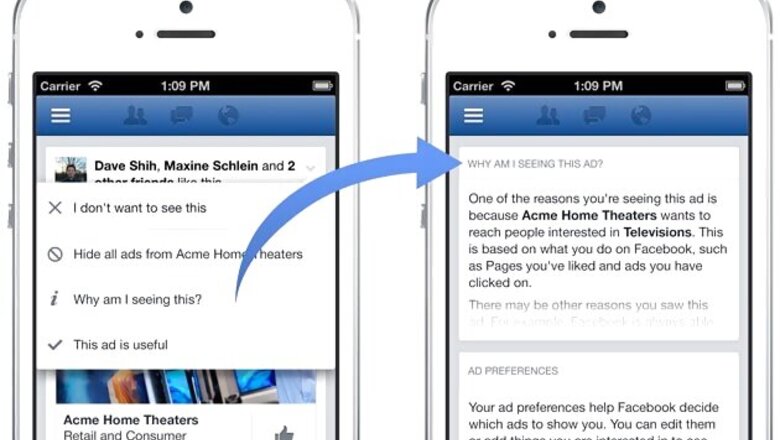
views
New York: If you use Facebook, the specific ads you see have been based mostly on what you do on Facebook - your profile information, status updates, likes and interests.
That's changing. The company says it will soon give advertisers more options to tailor ads to what you do outside Facebook. Shopping for a new TV? Get ready to see ads for TV sets on Facebook.
Unless you're willing to unplug, there's little you can do to avoid being tracked online. But there are some ways to control what ads you see and how the ads are tailored to you.
How it works:
Facebook doesn't share your specific identity with advertisers. Rather, the advertiser can select the types of people to show ads to.
An advertiser might want to reach women who just moved to Boston and who just got engaged, for instance. When buying the ad, the advertiser checks all the boxes that apply. Facebook matches the ads to the specific people who fit those attributes, without having to reveal their identities to the advertiser.
Besides the obvious attributes such as location, age and gender, advertisers can select languages, "ethnic affinity" and life events such as people who have recently moved, are living away from their family, got a new job and so on. Advertisers who want to target the newly engaged can narrow that down to engagements within one year or within three months. There are even options to target baby boomers, video game console players, early or late adopters of technology, fans of specific sports teams or people who go on cruises.
Facebook even considers your offline shopping behavior. Facebook's advertisers can see, for example, whether the ad for detergent you saw on Facebook led you to buy that brand in a drug store the following week. Facebook works with outside analytics firms to match what Facebook knows with what the retailers have on you and what you bought. Your name isn't attached to this, but it may still feel creepy.
Not every piece of data is used to target advertising, at least not yet. For example, the company recently introduced "nearby friends," which lets you share your exact location with your Facebook buddies so you can meet up. So far, you won't see ads targeted to you based on the street corner you are standing on, but it's easy to see how this could happen one day.
What's new:
In the coming weeks, Facebook will start offering advertisers another way to tailor ads in the U.S., based on information gathered from other websites you visit and the apps you use. This is called interest-based advertising, and Facebook says "many companies already do this."
Facebook already serves "retargeted" ads. So if you visited Zappos.com and looked at a pair of black flats, you might see the same shoes pop up in a Zappos ad on Facebook. With interest-based targeting, a company selling socks might show you an ad based on your interest in shoes - even if you did not previously visit its website.
What you can't control:
The best way to stop tracking is to stop using the Internet and move into a cave.
"Everywhere you go on the Web, with almost no exceptions, you are going to be receiving ads based on lots of data about you," says Jules Polonetsky, who advises Facebook on privacy issues as director of the Future of Privacy Forum, an industry-backed think tank in Washington.
A few Internet companies such as Twitter, Hulu and Pinterest, along with some advertising networks and analytics firms, have agreed to adhere to voluntary guidelines called "do not track." That lets people decline tracking by websites that they don't visit.
Google, Facebook and Yahoo - among the largest hubs for online advertising - aren't participating so far, so your preferences mean nothing there.
What you can do:
Facebook does participate in a version of "do not track" for mobile devices. To do this on iPhones and iPads with iOS 7, go to settings, then privacy, then advertising. Slide the lever next to "limit ad tracking" to the right, or green. On Android, go to Google settings (as opposed to the regular settings). Then choose ads and select "opt out of interest-based ads."
If you are a Facebook user in the US, you will soon be able to click on a drop-down menu on the top right corner of every ad to find out why it's being shown to you. You'll still have the option to hide the specific ad from your feed, or hide all ads from that particular advertiser. Now, you can click on "Why am I seeing this ad?" to see why the ad was targeted to you.
Reasons could be your interests, such as the Olympics or the World Cup, or an advertiser's desire to, say, reach women in your age group who live in your city. An ad offering called "lookalike audiences" lets advertisers target users with a similar profile as their existing customers. Let's say a restaurant's ideal customer base is over 35 and a fan of Mercedes-Benz. The restaurant can target this group with ads, for example.
You can opt out of having ads targeted to you here: http://www.aboutads.info/choices . Besides Facebook, some 115 companies are participating in the program.
That said, opting out of targeted ads won't stop you from seeing advertisements. They just won't be tailored to you based on your online profile and activities. It also won't stop Facebook (and other companies) from tracking you. It simply means that information won't be used to show ads targeted to you.



















Comments
0 comment